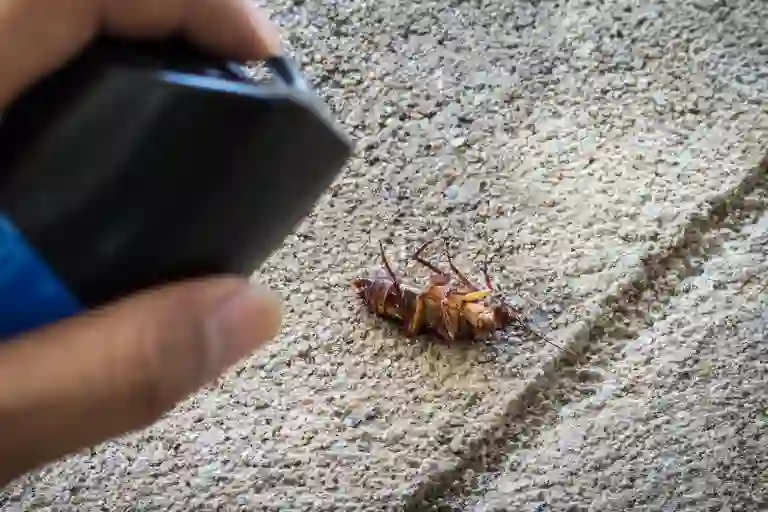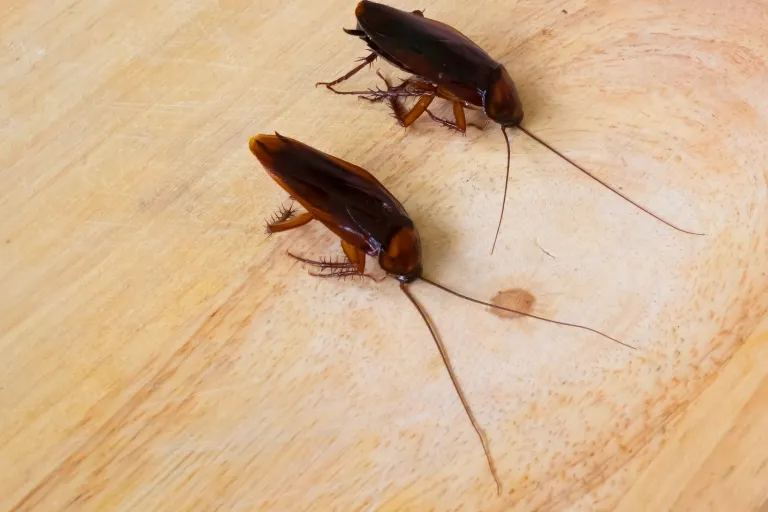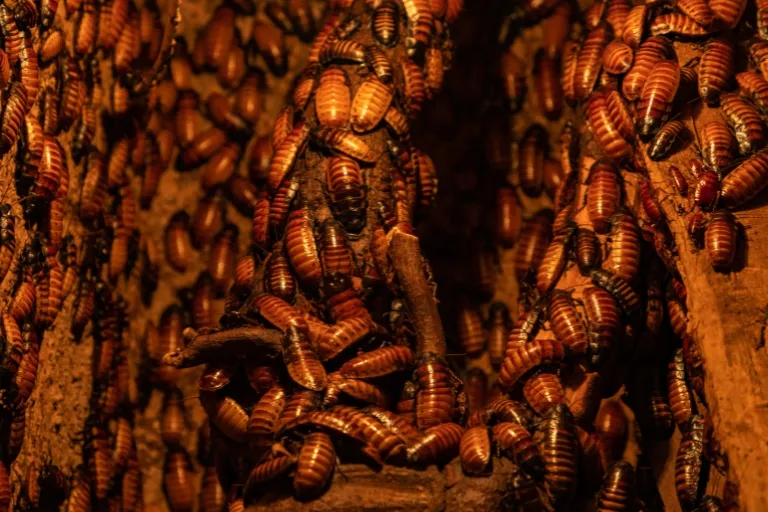When you kill a cockroach, it dies releasing pheromones that attract other roaches. These signals can lead to a temporary increase in the visibility of other cockroaches in the area.
Dealing with cockroaches can be a daunting task, given their reputation for resilience and the distress they cause in homes and businesses.
Understanding the consequences of killing a cockroach is essential for effective pest control.
The immediate aftermath is straightforward: the cockroach’s lifecycle ends.
Yet, the act of killing a roach often triggers an unintended chain reaction. The death-release chemicals serve as an alarm, prompting other cockroaches to explore the area for possible threats or food sources.
This knowledge serves as a crucial reminder that while killing individual roaches may seem like progress, it’s merely a single step in an ongoing battle against infestation.
Combating cockroach populations often requires more comprehensive strategies, including cleanliness, sealing entry points, and using traps or baits for broader impact.

Introduction To Cockroach Mystique
Cockroaches are among the oldest and most resilient insects on the planet.
Their ability to survive in various environments, adapt to change, and even weather the aftermath of a nuclear explosion has enshrouded these creatures in a shroud of mystique.
This segment delves into the fascinating world of cockroaches, dispelling common myths, exploring their role in nature, and explaining why their biology is key to understanding how to manage their populations effectively.
The battle against cockroaches is riddled with misconceptions. Here are a few myths that need debunking:
- Myth 1: Squashing them spreads their eggs – It’s a common fear, but it’s not true since cockroach eggs are protected by a tough casing called an ootheca.
- Myth 2: Cockroaches die instantly from household pesticides – In reality, these pests can sometimes survive typical treatments, highlighting the need for more effective approaches.
- Myth 3: All cockroaches are harmful – While some species are pests, many do not interact with humans at all and play a critical role in the environment.
Despite their notoriety, cockroaches fulfill essential tasks in nature. They are:
- Decomposers: By feeding on dead and decaying matter, they recycle nutrients back into the soil, aiding plant growth.
- Prey: Serving as a food source for a variety of predators, they are a key component in the food chain.
- Seed spreaders: Some species help with plant dispersion, making them unexpected contributors to biodiversity.
Gaining insights into the biology of cockroaches can empower us to combat infestations more effectively.
By understanding their reproductive cycle, preferred habitats, and survival tactics, we can implement targeted control strategies that are both efficient and environmentally friendly.
Knowledge of their biology also helps in developing non-toxic alternatives for cockroach management, reducing the reliance on harmful chemicals that can affect other wildlife and our health.
Debunking The Myths Surrounding Cockroach Death
Cockroaches have been formidable survivors for millions of years, and it’s no wonder that countless myths about their toughness abound.
From supernatural survival skills to post-death breeding frenzy, these myths paint cockroaches as almost invincible creatures.
Join us in this segment as we separate fact from fiction and uncover what happens when you terminate a cockroach.
Myth Vs. Fact: Do Cockroaches Survive Decapitation?
One of the most notorious myths is that a cockroach can live without its head.
Cockroaches indeed exhibit a bizarre form of resilience post-decapitation, due to their open circulatory system and the ability to breathe through small holes in their body segments.
They can indeed survive for weeks headless until they die of dehydration or starvation.
But let’s be clear: decapitation is fatal, and a cockroach without its head is merely living on borrowed time.
The Truth About Cockroach Resilience After Being Squashed
Many believe that a cockroach can effortlessly survive a squash. However, this notion doesn’t hold up.
Cockroaches are not invulnerable to physical damage. Squashing them will, more often than not, be fatal.
Their exoskeletons provide protection, but sufficient force will crush them. Though some might scurry away after a light stomp due to their fast reflexes, a decisive squish spells the end for these critters.
Dispelling The Myth Of Cockroaches Breeding When Killed
The myth that killing a cockroach causes it to release eggs and breed is entirely unfounded.
Cockroaches do carry ootheca (egg cases), but squishing them won’t automatically trigger the release and hatching of eggs.
Oothecae require time to develop, and the sudden death of the mother cockroach denies these eggs the protection and incubation needed.
Thus, killing a cockroach does not enhance the risk of breeding; it does quite the opposite.
The Actual Consequences Of Killing A Cockroach
While the act of killing a cockroach might provide instant relief to those who are squeamish at the sight of these resilient insects, the aftermath is more complex than simply eliminating a pest from your immediate vicinity.
Let’s delve into the details of what occurs upon the death of a cockroach and the broader implications this act can have, from immediate biological changes to potential environmental impacts.

Immediate Biological Impact On A Cockroach After Death
When a cockroach meets its untimely end, the immediate biological impact is swift.
A cockroach’s body goes through a sequence of neurological shutdowns, whereby its brain ceases to send signals to its muscles and organs.
This transition from life to death is marked by the cessation of all metabolic activities, such as respiration and digestion.
- Neuron Deactivation: The nervous system, responsible for coordinating movements and bodily functions, stops functioning.
- Stoppage of Circulation: Circulatory processes end, causing an absence of nutrient and oxygen flow.
- Decomposition: Almost immediately after death, microorganisms begin to break down the exoskeleton and internal tissues.
Potential Ramifications For The Cockroach Population
While one cockroach’s death may seem insignificant, it can have substantial effects on the local population.
These creatures are known for their rapid reproductive rate, and removing one individual, especially a fertile female, can reduce future generations.
Nonetheless, due to their survival adaptability, the impact on the population level might not be as immediate or significant:
- Disruption of Local Colony Structure: The death of a cockroach can affect its colony’s dynamics, potentially causing stress and the need for reorganization.
- Opportunity for Competitors: With one less competitor, other cockroaches or pests can rise in the population, altering the ecological balance.
- Reduced Gene Pool: Killing a cockroach with unique genetic traits may limit the genetic diversity within the population.
Secondary Environmental Effects Of Cockroach Extermination
Killing a cockroach can ripple through the environment, often in ways that are not immediately noticeable.
These insects are part of a complex ecosystem, where they play roles in breaking down matter and serving as food for predators.
The environmental effects might include:
| Aspect | Impact |
|---|---|
| Decomposition | Cockroaches decompose organic waste, aiding in nutrient cycling. |
| Food Web Disruption | Predators that feed on cockroaches may need to find alternative food sources. |
| Chemical Use | Pesticides used to kill cockroaches can have harmful side effects on other species and habitats. |
It’s important to consider these factors when dealing with cockroach infestations.
Knowing the biological and environmental impacts might influence how we manage pests and encourage the use of more sustainable extermination methods.
Effective Ways To Manage Cockroach Populations
Dealing with cockroach populations can be a nightmare for homeowners and businesses alike.
These hardy insects are not just unwelcome guests; they’re prolific breeders and potential carriers of diseases.
Simply killing a cockroach may grant temporary relief, but it does little to curb the invasion.
Effective management of cockroach populations involves strategic methods that prevent their spread, eliminate current infestations, and employ the latest advancements in pest control to keep them at bay.
Here we’ll delve into the different approaches and technologies that can help maintain cockroach-free environments.

Professional Versus Diy Cockroach Extermination Methods
When facing a cockroach problem, deciding between professional extermination and do-it-yourself solutions is critical.
Both methods come with their own sets of advantages and drawbacks.
Professional Extermination:
- Pros: Expertise in identifying the species, customized treatment plans, use of industrial-grade insecticides, and follow-up services.
- Cons: Cost may be higher than DIY methods; scheduling may not always be immediate.
DIY Solutions:
- Pros: Immediate action can be taken, lower initial costs, and a sense of personal control over the situation.
- Cons: Less effective overall, potential for misuse of pesticides, and a higher likelihood of recurrence.
Preventative Measures To Deter Cockroach Infestations
Prevention is often the best strategy against cockroaches. A few simple steps can greatly reduce the risk of an infestation:
- Seal cracks and small openings to limit entry points.
- Keep kitchen areas clean, including crumbs and spills.
- Avoid clutter where cockroaches can hide.
- Dispose of garbage regularly and use sealed bins.
- Address moisture issues like leaking pipes.
Implementing these preventative measures creates an environment that’s less attractive to cockroaches, cutting off their access to food, water, and shelter.
The Future Of Pest Control Technologies For Cockroaches
Innovations in pest control are constantly evolving. The future holds promising technologies that will enhance our ability to manage cockroach populations:
- Improved Baits: Scientists are working on more effective bait formulas that target a wider range of cockroach species.
- Birth Control for Insects: Methods that sterilize or interrupt the reproduction of cockroaches are being developed.
- Smart Traps: These use sensors to detect cockroach activity and can notify homeowners or pest control professionals when a trap has been activated.
- Biological Agents: Employing natural predators or pathogens in a controlled manner to reduce cockroach numbers without the use of chemicals.
These advanced solutions aim to provide more efficient, environmentally friendly ways to keep cockroach numbers in check.
Integrating Facts Into Pest Control Practices
Discovering the correct approach to Cockroach control requires sifting through a mixture of facts and fiction.
Upon eliminating a cockroach, understanding the implications helps homeowners steer clear of ineffective methods and adopt scientifically supported practices.
We’ll explore how integrating accurate information into pest control strategies can lead to more effective management of these resilient insects.
The Importance Of Accurate Information For Homeowners
Dealing with cockroach infestations begins with reliable information. Homeowners empowered with factual knowledge can make informed decisions about pest control.
Misconceptions might lead to insufficient solutions and continued infestations.
Accurate information guides effective cockroach control:
- Identifying cockroach species – Knowing which type of roach you’re dealing with can influence treatment strategies.
- Understanding cockroach behavior – Awareness of their habits helps in targeting efforts more precisely.
- Safe use of pesticides – Information on correct application reduces health hazards and environmental impact.
Educational Resources And Expert Advice On Cockroach Control
Credible resources such as entomology studies and pest control expert insights provide a wealth of knowledge for tackling cockroach issues.
Homeowners can utilize:
- Extension services from local universities for tailored advice.
- Online databases and scientific journals for up-to-date research data.
- Professional pest control services for specialized interventions.
These resources ensure the adoption of proven methodologies that are both effective and environmentally responsible.
The Balance Between Myth And Science In Pest Management
In the realm of pest control, myths can often overshadow scientific evidence, leading to ineffective practices.
Balancing these elements involves:
- Debunking myths– Challenging unproven methods and advocating for approaches rooted in scientific research.
- Educational campaigns– Raising public awareness about effective and safe pest management strategies.
- Continuous learning– Encouraging homeowners to stay updated with the latest findings in pest control technologies.
Only by aligning our actions with scientific principles can we ensure a productive battle against cockroaches.
FAQs Of What Happens When You Kill A Cockroach
Do More Roaches Come If You Kill One?
Killing a single cockroach does not attract more. Roaches are not drawn by the death of a fellow roach; however, eliminating one does not affect the overall population in your home.
Why Shouldn’t You Kill A Cockroach?
Killing cockroaches can spread their eggs, causing an infestation. It’s more effective to use bait and traps that cockroaches can carry back to their nests, targeting the entire population. Always opt for professional pest control for a long-term solution.
Why Should You Not Squish A Cockroach?
Squishing a cockroach can spread eggs or bacteria that they carry. It’s cleaner and more effective to use traps or insecticides.
Do Cockroaches Spread Eggs When Squashed?
Cockroaches do not spread eggs when squashed. Their eggs are encased in a hard shell, called an ootheca, which protects them from being easily crushed.
Final Words
Understanding the aftermath of dealing with a cockroach is crucial. It’s not simply about extermination. It’s the beginning of preventing re-infestation.
Keep your space clean, use repellents, and seal entry points. Remember, a single action sparks a chain of prevention.
Stay vigilant and cockroach-free.
Resources:
1. https://www.ncbi.nlm.nih.gov/pmc/articles/PMC4025297/
2. https://entomology.ucr.edu/news/2022/03/16/killing-cockroaches-pesticides-only-making-species-stronger
